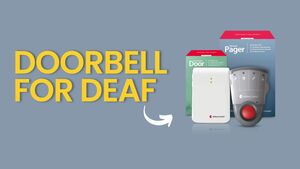Transform Home Safety with a Doorbell for Hard of Hearing
Cuerpo
The Best Doorbell Solutions for the Hard of Hearing
For individuals who are deaf or hard of hearing, everyday devices like doorbells can pose challenges in their standard design. Traditional doorbells rely solely on sound, leaving those with hearing impairments at risk of missing visitors, deliveries, or emergencies.
Thankfully, modern technology has introduced innovative solutions to this problem. A doorbell for hard of hearing users has features like visual alerts, vibrations, and app notifications, creating a more accessible and inclusive home environment.
This guide will help you understand the importance of hearing-impaired doorbells, explore their features, and choose the right one to enhance your lifestyle.
Why a Doorbell for Hard of Hearing is Essential
Filling the Accessibility Gap
A traditional doorbell system rings audibly, which is ineffective for individuals with partial or total hearing loss. This can lead to missed visitors or important packages and potentially unsafe situations, especially in emergencies.
Specialized doorbells bridge this gap, ensuring that people who are hard of hearing are promptly notified when someone is at the door through lights, vibrations, or connected devices.
Creating an Inclusive Living Space
Investing in a hearing-impaired doorbell helps create a home that is not just functional but also inclusive. It’s a small yet significant way to improve day-to-day convenience and security for everyone in the household.
How Do Doorbells for the Hard of Hearing Work?
Key Features of Modern Devices
Visual Alerts:These devices often feature flashing LED lights that activate when the doorbell is pressed, ensuring a visual cue even in noisy or silent environments.
Vibration Mechanisms:Some models come with vibrating receivers or wearable devices, such as pagers, that alert users through tactile signals.
Smartphone Integration:Smart doorbells notify users via smartphone apps, offering the convenience of receiving alerts anywhere in the house—or even when away.
Wireless Connectivity:Many wireless hearing-impaired doorbells allow easier installation and integration with existing smart home systems.
Adjustable Settings:Users can customize the intensity of lights, vibrations, and other alerts to suit their preferences.
Benefits of Using a Doorbell for Hard of Hearing
Enhanced Awareness
With visual and vibration alerts, these doorbells ensure you never miss a knock at the door again. They provide a sense of security and improve awareness throughout your home.
Convenience and Peace of Mind
Knowing your doorbell system is tailored to your needs reduces anxiety and helps you focus on other aspects of life without worry.
Smart Integration for Added Security
Smart doorbells cater to hearing needs and offer features like video monitoring and voice communication, allowing users to see and speak with visitors through their phones.
Features to Look for in the Best Hearing-Impaired Doorbell
Visual Indicators
The strength and clarity of light alerts are crucial. Bright, flashing LEDs are the most effective in catching attention, even in brightly lit environments.
Range of Connectivity
For larger homes, ensure the doorbell system has an extended range to reach all areas. Some devices include additional receivers to amplify alerts across multiple rooms.
Ease of Installation
Choose models that are simple to set up. Wireless options often require minimal tools and can be installed without professional help.
Battery Life and Power Backup
Ensure your doorbell has long-lasting batteries or power backup to remain functional during outages.
Installation Tips for Hearing-Impaired Doorbells
Choose Central Locations:Place the receiver or alert system in areas where you spend the most time, such as the living room or bedroom.
Consider Multi-Receiver Systems:For larger homes, additional receivers can ensure coverage across all rooms.
Pair with Smart Devices:Connect your doorbell to a smartphone or smart assistant for real-time alerts, even if you’re not home.
Test Your System Regularly:Monthly checks ensure all components, including lights and vibrations, function properly.
Maintaining Your Doorbell for the Hard of Hearing
Routine Care Tips
- Check Batteries Regularly:
- Replace batteries as needed to avoid missing alerts.
- Keep it Clean:
- Wipe the doorbell and receivers to remove dust or debris that might interfere with performance.
- Update Firmware:
- For smart models, ensure the firmware is up-to-date to maintain functionality and security.
Conclusion
A doorbell for hard-of-hearing users is more than a convenience—it’s a crucial tool for safety and accessibility. With options that include visual alerts, vibrations, and smart connectivity, these devices empower individuals with hearing impairments to stay informed and secure. Investing in the right doorbell can create an inclusive home environment that caters to everyone’s needs.
Whether you’re looking for a basic solution or a feature-rich smart device, there’s a hearing-impaired doorbell to suit your preferences. Take the first step toward a more accessible and secure home today.









Comentarios